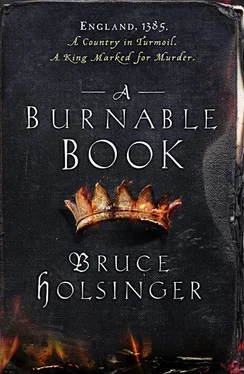Bruce Holsinger - A Burnable Book
Здесь есть возможность читать онлайн «Bruce Holsinger - A Burnable Book» — ознакомительный отрывок электронной книги совершенно бесплатно, а после прочтения отрывка купить полную версию. В некоторых случаях можно слушать аудио, скачать через торрент в формате fb2 и присутствует краткое содержание. Год выпуска: 2013, Издательство: HarperCollins Publishers, Жанр: Исторический детектив, на английском языке. Описание произведения, (предисловие) а так же отзывы посетителей доступны на портале библиотеки ЛибКат.
- Название:A Burnable Book
- Автор:
- Издательство:HarperCollins Publishers
- Жанр:
- Год:2013
- ISBN:нет данных
- Рейтинг книги:4 / 5. Голосов: 1
-
Избранное:Добавить в избранное
- Отзывы:
-
Ваша оценка:
- 80
- 1
- 2
- 3
- 4
- 5
A Burnable Book: краткое содержание, описание и аннотация
Предлагаем к чтению аннотацию, описание, краткое содержание или предисловие (зависит от того, что написал сам автор книги «A Burnable Book»). Если вы не нашли необходимую информацию о книге — напишите в комментариях, мы постараемся отыскать её.
A Burnable Book — читать онлайн ознакомительный отрывок
Ниже представлен текст книги, разбитый по страницам. Система сохранения места последней прочитанной страницы, позволяет с удобством читать онлайн бесплатно книгу «A Burnable Book», без необходимости каждый раз заново искать на чём Вы остановились. Поставьте закладку, и сможете в любой момент перейти на страницу, на которой закончили чтение.
Интервал:
Закладка:
‘Well spoken, Lord Chancellor,’ said the king, nodding boyishly. ‘By my command no one present may record or speak of what has happened here today. Your silence will be the test of your loyalty, to me and to this realm.’
Watching the effect of all this I marvelled at the chancellor’s disingenuous appeal for circumspection. The servants were already whispering, and soon every detail of the exchange would cover London as rumours of Dido swyving Aeneas blanketed Carthage. It was the performance of discretion that counted, the useful fiction that we were all somehow privy to the clandestine workings of the military. The aristocracy has always loved such insider talk of espionage and coming war, and Michael de la Pole played to this fancy like a master.
‘Uncle,’ said Richard to Gaunt, ‘take the arm of the Earl of Oxford.’ With a reluctance lost on no one, though also with a visible relief, John of Gaunt and Robert de Vere joined arms and faced Richard. ‘And now,’ the king continued, ‘if the Lord Bishop of Winchester will permit it, our Mass shall continue.’
The disordered crowd became an orderly congregation, the women finding their places to the rear of the assemblage. When the Mass was concluded I spent a while looking around the grounds for Chaucer, wanting to ask him the dozen questions rattling through my mind, though he was nowhere to be found. In the hall Wykeham sat alone on the dais, his guests of honour absent, a scowl and a napkined lip accompanying his every sip of wine. Though the feast was only beginning, it seemed that nearly everyone of importance had left the palace grounds: Lancaster, Swynford, Joan of Kent-
Though not Oxford. He had remained in the central courtyard and was leaning against one of the large posts holding up the pavilion, staring off into the distance with the copy of the De Mortibus still clutched in his hands. I approached him and waited until he turned to me.
‘Give me the book, your lordship,’ I murmured.
His lip curled. ‘Why would I possibly do such a thing, Gower?’
‘I know everything there is to know,’ I lied, though fairly confident in my speculations. ‘Hawkwood, Sir Stephen, the origin of the prophecies.’
He flinched. ‘Who would believe you , of all people?’
‘Belief is beside the point, my lord,’ I said tiredly. ‘Written proof? That is another matter.’
His eyes widened for a moment, then settled back into their familiar disdain. ‘Your tricks don’t intimidate me, Gower. You have nothing.’
I waited before I spoke, giving him a long moment to squirm. ‘Are you quite sure, my lord? Simon is a thorough young man. You don’t think he tracked Weldon’s comings and goings, or thought to leave behind a record of some kind, perhaps a document or two in Sir Stephen’s hand — or yours? I can show them to you, if you’d like.’
The earl shifted on his feet. I held his eyes, watching as the weakness I had always sensed in this man crept slowly over his features. Finally he looked away, then down at the manuscript still in his hands, this book that had caused so much anguish, sought by half a kingdom and now seemingly worthless. The earl appeared to realize this as he gave a slight shrug and handed me the volume. I stuffed it in my bag.
‘You have made a wise decision, your lordship.’ I gave him a slight bow, allowing him to save face in case of any onlookers. ‘We shouldn’t need to speak of this again.’
He waved me off as he turned, calling angrily for his page and making for the main gates. The Earl of Oxford was still young, though his back was stooped as he walked away from me, his stride unconfident and self-conscious. This magnate would end the day a lesser man.
I was about to turn for the stable gate and home when I saw a movement to the earl’s right. From the far side of the grange Sir Stephen Weldon emerged and stood in front of Oxford with his hands upraised, blocking his way. The two of them exchanged words. They were too far away to make anything out, but it was clear the knight was speaking angrily, even defiantly, to his lord, whose slouch now indicated the extent of his humiliation before the king. Oxford raised his fingers to his face, pinched his nose, wagged a hand. Not dismissing Weldon, I thought; it looked rather like a gesture of acquiescence.
Weldon spun on his heel and strode off, heading for the postern door farther down the wall. The earl watched him for a moment, then turned slowly back. I did nothing to conceal myself as I came into his line of vision. He looked unfazed by the evidence of my eavesdropping, which Weldon had not observed. The earl gave me a long look, then tilted his head slightly in the direction of the postern before turning for the main gate.
Weldon had already disappeared through the low door on to New Rents, though the earl’s message seemed clear enough. It would be in my interest to follow him, Oxford was telling me, wherever it led. I stood there for a moment, exhausted, wanting nothing more than a drink and a rest. Then, with a growing unease, I turned for the postern and the streets of Southwark.
FIFTY-TWO
New Rents, Southwark
An attack on the king?
In the midst of Mass.
But who done the thing?
And where can we find him to give our thanks?
Or a ‘Better luck next time!’
Or a ‘Richard? Why not Lancaster?’
None of that talk, now. Enough treason in the bishop’s liberties to go around.
Who done it, then?
Fishmonger, what I heard.
No, a butcher.
Butcher?
Whole scare of them, led by that cutter Grimes.
Ah! No surprise there.
Millicent hardly noticed the postern opening to her left, rapt as she was by the news being shouted about at the gate. The man who stepped through noticed her not at all, and until he passed she gave him no more than a glance, assuming that anyone exiting Winchester Palace by that door would be a servant on an errand. As he walked past Millicent saw his lower face, though his eyes were shadowed beneath a knight’s hood. A scar traced a crescent-shaped path from his lip to the turn of his chin. Millicent knew that scar.
It came to her, finally. A hooked scar, white against sun-darkened skin. The ward watch, Eleanor said, had identified him as ‘Sir Stephen’ — and now she recalled his surname. He was Sir Stephen Weldon, a longtime member of Sir John Hawkwood’s company, and a knight of Oxford’s household. Sir Humphrey had pointed him out to her at a tournament, making an acerbic comment on the Italian style of his arms and raiment. ‘Rides like a Visconti,’ he’d said with disdain. ‘Scarred like one, too.’ Weldon was a badged man, sporting Oxford’s livery proudly around his collar, and his own on the back of his surcoat. Quarterly or and gules, and there, in the first quarter, a mullet argent: the silver star of the Veres, plain as the moon.
Yet even as she watched his back recede down New Rents she heard another voice in her head. It’s the crochet. His face. Some of her sister’s last words, gasped from a bleeding mouth. Now she understood them. Sir Stephen Weldon, the man with the hook on his face.
The killer of Agnes.
Without thinking Millicent followed him down the alley beside the Overey churchyard and on to the crowded high street past the fishwives and the pillory. He jogged left on Pepper Alley, then into a narrower lane that led toward the mills on the river side of the palace wall. Millicent kept a safe distance, though never once did Weldon glance behind him.
As they neared the bankside she slowed her steps. Weldon’s route had traced a full circle. He was now climbing a short but rough stairway built into the near embankment. He disappeared over the top. She took the steps slowly, stretching to peer over the dyke and down to the river. Just as she reached the uppermost step, she caught a glimpse of him on the near side of the wharf, keying open a low door set into the embankment. With his foot the knight dragged a small stone to the opening, wedging the door open before disappearing within.
Читать дальшеИнтервал:
Закладка:
Похожие книги на «A Burnable Book»
Представляем Вашему вниманию похожие книги на «A Burnable Book» списком для выбора. Мы отобрали схожую по названию и смыслу литературу в надежде предоставить читателям больше вариантов отыскать новые, интересные, ещё непрочитанные произведения.
Обсуждение, отзывы о книге «A Burnable Book» и просто собственные мнения читателей. Оставьте ваши комментарии, напишите, что Вы думаете о произведении, его смысле или главных героях. Укажите что конкретно понравилось, а что нет, и почему Вы так считаете.












